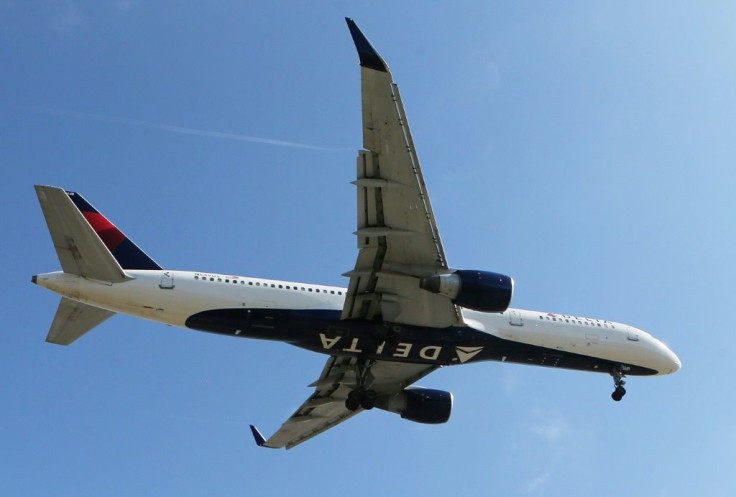Should U.S. Airlines, Suffering From Plunging Demand, Receive A Government Bailout?

KEY POINTS
- U.S. air carriers are now flying at only 20% to 30% of capacity
- Donald Trump has vowed to help the airline industry
- U.S. airlines have handed out massive payments in recent years to stockholders and executives.
U.S. airlines, suffering from falling demand and travel bans around the world as a result of the coronavirus epidemic, have pushed for a huge $50 bailout from the government to save their industry.
Airlines for America, a trade association and lobbying group that represents major North American airlines, said most U.S. air carriers are now flying at only 20% to 30% of capacity.
"This is getting worse each day with no end in sight," said the group's CEO, Nicholas Calio.
Delta Air Lines (DAL) has grounded 600 planes and slashed capacity by 70%. United Air Lines (UAL) cut capacity by 60%.
Airline stocks have also sunk. Year to date through Wednesday, United fell 75.7%, American Airlines (AAL) dropped 59.2%, Delta plunged 59.6% and Southwest Airlines (LUV) has tumbled 34.6%.
Aerospace giant Boeing (BA) has tumbled 68.5%.
The S&P 500 Airlines Industry Index has shed 42.5% year-to-date, versus the S&P 500’s overall 26.1% drop.
“The situation is deteriorating rapidly for the [airline] industry, increasing the likelihood that government assistance will be required to maintain liquidity and manage through this crisis,” Bernstein analyst David Vernon.
President Donald Trump has vowed to help the airline industry.
"Airlines would be No. 1," Trump said. "You go from having the best year they have ever had to having no passengers because of what we have had to do to win this war – and it's a war."
Lou Whiteman wrote in Fool.com: “If nothing else, a show of government support should help reassure airline suppliers, creditors, and counterparties that the companies can make it through the downturn, which should help the airlines negotiate extensions, raise new debt, and take other actions to get through the crisis.”
However, reports have emerged that U.S. airlines have handed out massive payments in recent years to stockholders (through share buybacks) and executives.
The Guardian reported that these payments amounted to $45 billion over the past five years for the country’s five largest airlines. These buybacks have improved earnings per share and stock prices.
Specifically, Delta Air Lines, American Airlines, United Airlines, Southwest Airlines and Alaska Air Group (ALK) spent $44.9 billion on share repurchases and dividends over the past five years, while paying almost $750 million to executives over that period.
For example, American Airlines spent $13 billion on share buybacks over 10 years through 2019, while it had negative free cash flow.
Sara Nelson, president of the Association of Flight Attendants, said that any bailout by the government should include “significant conditions” that bars airlines from enriching shareholders or padding executive bonuses.
“We have told Congress that any stimulus funds for the aviation industry must come with strict rules,” she said. “That includes requiring employers across aviation to maintain pay and benefits for every worker; no taxpayer money for CEO bonuses, stock buybacks or dividends; no breaking contracts through bankruptcy; and no federal funds for airlines that are fighting their workers’ efforts to join a union.”
An estimated 750,000 people currently work in the U.S. airlines industry, but these companies have already cut more than 10,000 jobs in the past five years.
However a spokesperson for Airlines for America, , defended such payouts, citing that U.S. carriers invested 73% of their operating cashflow “back into the product” -- including investments in new aircraft, facilities, grounding equipment and technologies – while reducing debts by $91 billion.
Still, any bailout of the airline industry may face stiff opposition from Democrats.
Among other things, Democrats have demanded restrictions on executive pay bonuses and stock buybacks.
Sen. Tammy Duckworth (D-Ill.) said she wanted to protect the jobs of airplane mechanics.
"The last time this happened, we wiped out the heavy repair industry and all those jobs went to Mexico and Brazil," she said. "The last time we helped out the airlines we didn’t actually put any guardrails around some of this money, whether it’s task credits for repair work -- so the maintenance companies actually went out of business. The airlines came back but all of those maintenance jobs went overseas and we need to make sure that we keep those jobs here. So the MROs, the maintenance repair operators, they need to be protected as well."
Even some Republicans are uncomfortable with the term bailout. Senate Appropriations Chairman Richard Shelby (R-Ala.) said he “would have some real concerns” about a “bailout” for the airline industry, but added that “loans” are a “different” matter.
“Given [the airlines’] importance to our economy, and to our eventual recovery… we are going to have to provide some sort of assistance — whether it should be in the form of loans, secured loans, I’m not sure yet,” said Sen. Susan Collins (R-Maine).
A group of eight Democratic senators headed by Sen. Sheldon Whitehouse of Rhode Island asked that any bailout include provisions for airlines to cut their carbon emissions.
“Given the poor records of some companies in these industries, we believe that any such financial assistance should be paired with requirements that companies act in a more responsible fashion,” read the letter from the group.
© Copyright IBTimes 2024. All rights reserved.




















